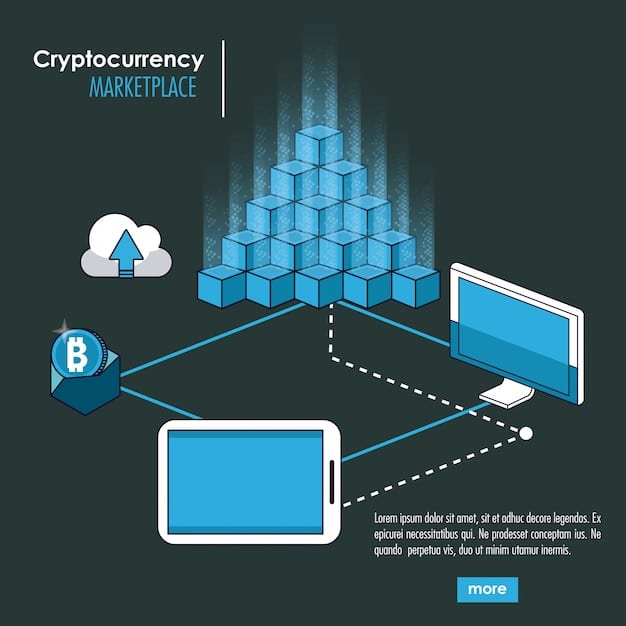Blockchain Technology: Latest US Developments Beyond Cryptocurrency

Blockchain technology in the US is advancing beyond cryptocurrency, finding applications in supply chain management, healthcare, digital identity, and voting systems, driven by its security and transparency.
The narrative around blockchain technology has long been dominated by cryptocurrencies, but in the United States, innovation is pushing its boundaries far beyond digital currencies. Uncover what are the latest developments in blockchain technology beyond cryptocurrency in the US, showcasing its transformative potential across various sectors.
Blockchain Beyond Bitcoin: Emerging US Trends
While Bitcoin introduced the world to blockchain, its potential extends far beyond digital currency. In the US, various industries are exploring blockchain’s capabilities to enhance security, transparency, and efficiency.
Let’s delve into some of the key areas where blockchain is making significant strides.
Supply Chain Management
One of the most promising applications of blockchain is in supply chain management. By creating an immutable record of each transaction, blockchain can improve traceability and reduce fraud.
Healthcare
Blockchain is being explored to secure patient data, streamline medical record management, and improve the drug supply chain. The technology’s ability to ensure data integrity and privacy is particularly valuable in healthcare.
- Improved Traceability: Tracking products from origin to consumer.
- Enhanced Security: Protecting sensitive patient data.
- Reduced Fraud: Preventing counterfeit drugs from entering the supply chain.
- Streamlined Processes: Automating and optimizing supply chain operations.

Blockchain’s ability to provide a secure and transparent ledger is driving its adoption in industries seeking to improve their operational efficiency and build trust among stakeholders.
Healthcare Revolution: Blockchain Applications
In healthcare, the need for secure and interoperable data systems is critical. Blockchain offers solutions that can address these challenges, potentially transforming how healthcare data is managed and shared.
Explore how blockchain is making inroads in various healthcare applications.
Securing Patient Data
Protecting patient data is paramount. Blockchain’s decentralized and encrypted nature makes it an ideal technology for securing sensitive medical information.
Improving Interoperability
Blockchain can facilitate the secure exchange of medical records between different healthcare providers, ensuring seamless care coordination.
- Data Integrity: Ensuring the accuracy and reliability of patient records.
- Patient Empowerment: Giving patients control over their medical data.
- Reducing Costs: Streamlining administrative processes and reducing fraud.
- Enhancing Research: Facilitating secure data sharing for medical research.
The use of blockchain in healthcare has the potential to revolutionize the industry by enhancing data security, improving interoperability, and empowering patients.
Digital Identity: Blockchain Solutions in the US
Managing digital identities in a secure and efficient manner is a growing concern. Blockchain offers innovative solutions to create decentralized and self-sovereign identity systems.
Discover how blockchain is being used to establish more secure and user-centric digital identities.
Decentralized Identity Systems
Blockchain enables individuals to control their digital identities without relying on centralized authorities. This can reduce the risk of identity theft and fraud.
Secure Credentials Management
Blockchain can be used to issue and manage digital credentials, such as diplomas, certifications, and professional licenses, in a tamper-proof manner.
- User Control: Empowering individuals to manage their own data.
- Enhanced Security: Reducing the risk of identity theft and fraud.
- Interoperability: Facilitating seamless identity verification across different platforms.
- Cost Savings: Reducing administrative overhead associated with identity management.
Blockchain is enabling the development of more secure, user-centric, and efficient digital identity solutions, giving individuals greater control over their personal data.

Blockchain in Voting: Enhancing Security and Transparency
The integrity of voting systems is crucial for maintaining democracy. Blockchain technology is being explored as a potential solution to enhance the security and transparency of elections.
Explore how blockchain can be applied to create more trustworthy voting systems.
Secure and Transparent Elections
Blockchain can create an immutable record of votes, making it more difficult to tamper with election results. The technology’s transparency can also help increase voter confidence.
Simplified Voting Processes
Blockchain can streamline the voting process, potentially reducing the barriers to participation and making it easier for citizens to exercise their right to vote.
- Immutable Records: Ensuring the integrity of vote counts.
- Enhanced Transparency: Increasing voter confidence in election outcomes.
- Improved Accessibility: Streamlining the voting process for citizens.
- Reduced Fraud: Preventing voter fraud and election manipulation.
While challenges remain, blockchain’s potential to enhance the security and transparency of voting systems is attracting considerable attention and investment.
Blockchain for Intellectual Property Protection
Intellectual property (IP) protection is a critical concern for creators and businesses alike. Blockchain offers innovative solutions for registering, managing, and protecting IP rights.
Discover how blockchain is revolutionizing the way intellectual property is secured and monetized.
Secure IP Registration
Blockchain can provide a secure and transparent platform for registering patents, copyrights, and trademarks, creating an immutable record of ownership.
Streamlined IP Management
Blockchain can facilitate the licensing and transfer of IP rights, making it easier for creators to monetize their works and for businesses to manage their IP portfolios.
- Secure Ownership: Establishing clear and immutable records of IP ownership.
- Efficient Licensing: Streamlining the process of licensing and transferring IP rights.
- Reduced Costs: Lowering administrative overhead associated with IP management.
- Global Protection: Facilitating international IP protection and enforcement.
By providing a secure, transparent, and efficient platform for IP management, blockchain is empowering creators and businesses to protect and monetize their intellectual property more effectively.
Challenges and Future Outlook for Blockchain in the US
While blockchain technology offers numerous benefits, its adoption in the US faces several challenges. These include regulatory uncertainty, scalability limitations, and a shortage of skilled professionals.
Let’s examine the key challenges and explore the future outlook for blockchain in the United States.
Regulatory Hurdles
The lack of clear regulatory frameworks for blockchain technology in the US can create uncertainty and hinder investment. Clear and consistent regulations are needed to foster innovation and adoption.
Scalability Issues
Many blockchain platforms struggle to handle a high volume of transactions, which can limit their applicability in certain industries. Researchers are working on solutions to improve blockchain scalability.
- Regulatory Clarity: Establishing clear legal frameworks for blockchain technology.
- Scalability Solutions: Developing technologies to improve blockchain transaction throughput.
- Skills Development: Training and educating professionals in blockchain development and management.
- Interoperability Standards: Promoting the development of standards to ensure blockchain systems can work together.
Despite these challenges, the future of blockchain technology in the US looks promising. As regulatory clarity emerges, scalability solutions are developed, and a skilled workforce is trained, blockchain is poised to transform a wide range of industries.
| Key Aspect | Brief Description |
|---|---|
| 📦 Supply Chain | Improves traceability and reduces fraud in product tracking. |
| ⚕️ Healthcare | Secures patient data and streamlines record management. |
| 🔑 Digital Identity | Offers decentralized identity systems for user control. |
| 🗳️ Voting Systems | Enhances election security and transparency. |
Frequently Asked Questions
▼
Blockchain improves traceability, reduces fraud, and enhances efficiency by creating an immutable record of transactions, ensuring secure and transparent tracking throughout the supply chain.
▼
Blockchain secures patient data through its decentralized and encrypted nature, ensuring data integrity and privacy. It also streamlines medical record management and enhances data sharing among providers.
▼
A decentralized identity system allows individuals to control their digital identities without relying on centralized authorities. Blockchain supports this by providing a secure and transparent platform for managing personal data.
▼
Yes, blockchain can enhance the security and transparency of voting systems by creating an immutable record of votes. This makes it harder to tamper with election results and increases voter confidence.
▼
Key challenges include regulatory uncertainty, scalability limitations, and a shortage of skilled professionals. Overcoming these hurdles is crucial for unlocking blockchain’s full potential across various industries.
Conclusion
In conclusion, blockchain technology is rapidly evolving in the US, extending its influence far beyond cryptocurrency. With applications in supply chain management, healthcare, digital identity, voting systems, and intellectual property protection, blockchain is transforming industries by enhancing security, transparency, and efficiency. While challenges remain, its potential to revolutionize various sectors is undeniable.





